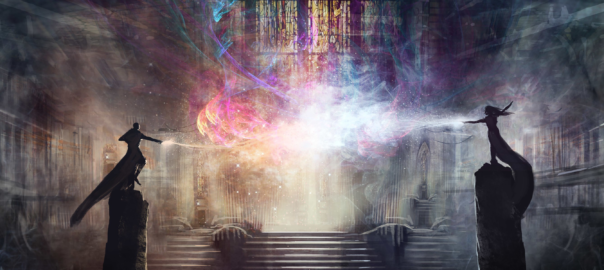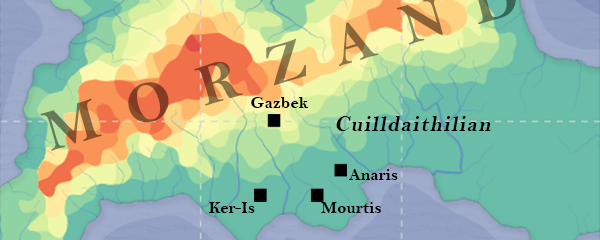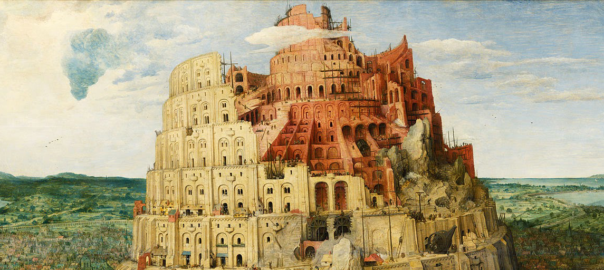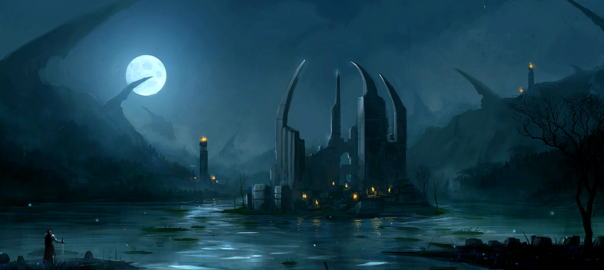CONTENT WARNING: Extreme violence, torture, and mass murder.
Something about the list of prices made it real. Souls of the dead, not for sale but as sale. One hundred souls for a wand of war, one thousand for a ring that would make its wearer invisible. It was not as though Emla had just learned of the trade in souls. She was educated: she knew what prayer was for. The list made her think of the torments suffered by forsaken souls. She wondered if this was a sign of weakness in her. She might retire soon. She’d been thinking about it more often recently. To get out of the city once and for all. She’d have to spend a year in the clanlands and pay respects to the ancestors, but then she could live on the family estate and raise chickens. It wasn’t her first wish but she wanted to serve the clan. That came before anything else.
Emla opened her eyes when she heard footsteps approaching and looked up at a servant who sat down a stool for another woman. The other woman was aged like Emla but fatter and lighter-skinned, with wisps of grey-black hair (somewhat resembling a full head of it) rising from her scalp. She wore wide-legged trousers but her upper body was swathed in a shawl of rampant pattern, favoring red and green. If Emla hadn’t known Darya, she would have said that the woman’s face was kindly. Now she saw a new plot in every smile.
The servant, in red a creature of the Orlingvir, let themself be dismissed. Emla had sent them with purpose to Darya and the servant knew their business. The Painted Hall belonged to the two of them now, the other members of the Great Council having departed. They sat surrounded by the evidence of centuries of mediocrity, the legacy of the Orlingvir’s ancestors. The exploits of others but re-faced. The whole south wall devoted not to his family but to the drama of Bulokas and Szakish, a war of the gods. Emla — a thin old woman in a worn but stately green shawl, who even held an office granted by the Orlingvir — herself represented a far greater power.
Emla knew that she might never find out how heavy Darya’s hand was in this infernal trade. Emla’s agent had said that the workhouse of the artificers was guarded by a gang called the Hawks, well known to be creatures of Clan Nushak, and Darya was also a member of Nushak. Most saw her as the clan’s leader in Adamabad. Emla saw her that way. That didn’t mean that Darya knew that a camarilla was being run under her nose.
“Darya Chelnik, salute,” Emla said in her hoarse voice. She extended both hands and Darya clasped them in both of hers.
“Emla Chelnik, salute,” Darya said, her own voice full and dry. She let go of Emla and rearranged her shawl. “How is your cousin?”
“He is well, I expect,” Emla said. “Hoping to settle the war soon, as are we all.” Emla had many relations in the empire and beyond, but anyone from another clan asking about “her cousin” only meant one person: Emperor Khurrozi who, like her, was of Clan Meymekhat.
“Gods willing,” Darya said. “Every day might bring another riot.”
Emla didn’t close her eyes and didn’t sigh but she was keeping herself from to doing both. Darya wanted to fence. Emla said “Indeed.”
Darya frowned. “So why did you have a servant fetch me, auntie? I should be on my way home to eat, you know.”
Still fencing. “Will you listen to a story, child?” Emla said.
Darya’s nostrils flared. Only a few years separated them. They had both worked hard, both wielded a great deal of influence. Emla wasn’t surprised that Darya was aggressive. Their clans were on opposite sides of the civil war currently ripping through the clanlands, the same war which was the root of riots in cities throughout the empire, including Adamabad. Darya knew very well she wouldn’t like whatever Emla had to say. Darya had not been educated in the capital but she wasn’t stupid. Emla had been disabused of that idea years ago.
“Let me eat, mama,” Darya said and she put her hand to the floor.
“Sister,” Emla said, reaching out to touch Darya’s arm, “should I apologize?”
Darya made her face cool. She straightened up on her stool again. “What do you want?”
“Sister, I do want to tell you a story, a true story,” said Emla. “These are recent events in Maloxia across the sea. Did you know that a demon sat the throne of that empire?”
“Great gods, no,” Darya cried out, then clapped a hand over her mouth. The sound of her voice rang a moment. “But not anymore? The demon has been slain?”
“He sat the throne just a little longer than a month.”
“Praise the Victors,” Darya said, which would have been strange to hear from her in any other situation. “So which of the Orders now rules Maloxia?”
“None of them,” Emla said. “They raised a new emperor and continue to rule themselves.”
Darya raised her eyebrows. “Well then, auntie, this is a story I would like to hear.”
Emla slowly bared her teeth.
Darya raised her hands and said “Sister, sister, abeg.”
Emla relaxed and brushed the offense away with her hand.
“You know that Maloxia is ruled by its navy?” Emla asked.
“I’ve heard that. It’s a human country?”
“It’s Aridhan, but its emperors are human.”
“That’s what I meant, sister,” Darya said.
Emla paused, then continued. “It’s up through the navy that this demon came. He was called Daoud and he took the form of a beautiful human, lean like a wolf, like a hawk of the land. He enlisted with the Armada as a matross and was employed on land, one of the lowliest there were. His comrades knew him then as a fanatic who gave everything up to the Triad, the three gods that the Maloxians worship. He volunteered for patrols until he led patrols, and he found other religious stalwarts and preached to them against banditry. He led his followers out to attack and seize bandits wherever they could be found. With twenty fighters he waged a war against the agents of the roads. The Armada made him a knight for this. They had no choice: he was becoming known. With the new degree came the power to accomplish even more. And at that time, the word in the wind told of a great cult of demoniacs which had gathered in their western country.”
“They are filthy with demons over there,” Darya said. “I could never step foot on that accursed continent.”
“Sister,” said Emla.
“Abeg, I am hearing you,” said Darya. “The man is a knight in their navy.”
“And there were demon worshippers in the west. After many many months, the western army of Maloxia could not capture this demon cult. When they had failed so many times, they then asked the navy to bring the knight Daoud to come root out these heretics. Daoud came there with his fighters and in thirteen days he had taken the heads of the cult leaders, and these were identified by people who had survived those demoniacs. People throughout the empire began to know of him. The Sea Lords who ruled the Armada had noticed him, too. Most felt that he should be given a land command but some thought he might finally be given a ship, a promotion for many but a sure end to his career against bandits. He got neither. Instead, he was made a functionary of one of the Sea Lords, an assignment which forced him to reside in High Malox, the capital of their empire.
“As imperial cities, High Malox and our capital are not comparable. Our empire is greater, without question, but the capital itself might be our third city. High Malox is the Maloxian Empire and the Maloxian Empire is High Malox. Nothing in that vast dominion is really important unless it happens in the city, as the Maloxians say. Daoud’s entry into the city put him at the heart of imperial affairs. He had been rescued from the sea by a benefactor called Lord Ramya, a cleric of the Triad Church, so he joined her party. His devoutness made him loved by the Church and his charm made him popular with the nobles. His patrols of the city streets brought prestige to Armada and Church alike. Not even half a year since Daoud arrived had passed when the city was gripped by despair: the son of one of the emperor’s favorites, Count Pradeep, had been abducted. It was Daoud himself that rescued the child, wading into the camarilla’s lair with sword in hand, emerging with the child, both painted in blood but unscathed.
“As a knight, Daoud could claim the title of hidalgo. As reward for this service, the emperor at this time — whose name was Iderses — elevated Daoud to the rank of count. Soon, Daoud was engaged to marry the niece of Count Lorrin, the Second Sea Lord, which would attach him to a prestigious family of the empire.
“Almost immediately after those plans were set, the emperor was killed along with 23 hours of the royal household at least. It was a spell, of course: a sudden intense heat gripping the main house and little else, causing its fires but chiefly killing by the cooking heat alone. It was first assumed to be some mishap of a palace sorcerer, none of whom survived to be questioned. The empire mourned but the worthies did not wait, they gathered swiftly to decide their next action. As Emperor Iderses’s child and heir had also died, a council of decision was formed to elect the next ruler. Lord Ramya, a member of this council, proposed that they elect Count Daoud as the next Maloxian emperor. As an outsider with a reputation for fighting criminals and demons, he would be popular with the common people. As a human, he would not shift the marriage aspirations of the nobility. Finally, as an untutored military man and a devotee of the Triad, he would be a creature of this council. This convinced the rest of the council; not all, but enough that their choice was clear. The council of decision declared that Daoud would now rule their great empire.”
“Gods forfend,” cried Darya. “And this was the demon?”
“He was the demon, yes,” said Emla.
“How could they have let this happen?”
“They did not let it happen. They had been outmaneuvered, for a moment, by a cunning demon, an immortal hell-creature. This demon emperor Daoud was crowned shortly thereafter and was married on the same day. As soon as he was enthroned, Daoud cast suspicion on everyone who survived the death of the old emperor, and all such people were speedily replaced. Not only was the captain of the guard dismissed, nearly every member of the guard was thrown out, to be replaced by new fighters. Not only servants but even traders who prided themselves as royal suppliers now had their business refused. Count Lorrin was named archcleric (which is like our grand vizier) and many of the new appointments came from her circle of associates.
“But the city talked. Not all of the emperor’s servants could be replaced with the same speed. Those who were dismissed met different fates. Some were suddenly and cruelly killed. Others fled the city or went into hiding. As they left, they scattered the pieces of what they’d seen throughout the city. Piece by piece, the story of what was happening inside the palace was assembled outside its walls. The Triad of Emperor Daoud demanded blood. Oaths of undying loyalty to Daoud were being carved into flesh. Uncanny shadows crept through the halls. The consort, already pregnant and bedbound, was cloaked in a presence of such inexplicable malevolence that no nurse could be around her and no one could tend her unless they had taken the flesh-carved oath. The emperor took a strange form at night, it was said, and each day another part of the palace was restricted for his personal use.
“Lord Karolkarem, the guard captain dismissed by Daoud, still lived in the city. He had survived two attempts on his life already when he was approached by the magistrate for the empire, Count Batulay. Naturally, the emperor couldn’t simply dismiss her, but he made himself and the palace inaccessible to her. Batulay and Karolkarem were both familiar with what was supposed to be happening around the emperor. They decided that they had to break into the palace and deal with the malefic presence which had established itself there. Lord Karolkarem summoned a half-company of fighters and they attacked the palace. Count Batulay’s powerful magic subdued the guard and broke through the demonic defenses, allowing Karolkarem and his troop to storm the building. Inside, they confirmed all the horrors that had been rumored and more. Many lives were lost against the demon called Daoud but he was slain that day. With all they knew to be true, Karolkarem and his fighters did not rest. The lord held one of Daoud’s broken horns. He no longer doubted what was happening.
“What grew within the consort was a cambion. Batulay crushed the consort’s womb with magic, then the fighters slashed her throat and hacked her body apart to make sure that the child could not live. Count Batulay sealed the palace so no one could leave while Karolkarem went from chamber to chamber, murdering everyone they found by the sword until swords got too dull, and then by whatever instruments they could find. They battered to death servants of every kind, they disemboweled retainers, they threw children down stairs. They murdered all 24 hours in the palace that day. No one there died an unsupervised death.
“After this, Count Batulay assembled a few locals to made a council of decision and elect Karolkarem as the new emperor. Word spread in the city and soon Karolkarem had over 1,000 fighters with him. The force first marched to the Palace of the Sea Lords. Those Sea Lords who had supported Daoud were either not in the city or had already fled, and the two who remained speedily accepted the decree of Batulay’s council. High Malox fell to the new emperor almost instantly. Those nobles and officers who had favored Daoud would find no support anywhere; their oldest friends and most loyal associates abandoned them when it became clear what Daoud was. It was not long before Karolkarem had full control of the Armada and the other military forces of the empire.
“Both Emperor Karolkarem and Count Batulay knew that the empire was not yet safe. Needing channelers they could trust, Batulay invited inquisitors from the Land of Mum to aid them in wiping out the demonic threat plaguing Maloxia. Count Lorrin, the archcleric, had been killed alongside the demon, so Karolkarem ordered her manor to be ransacked. Soldiers invaded Lorrin’s home and seized everyone they found. Most were butchered where they were caught, streaking blood across the floors and onto their killers. Others were held until a magician and a channeler could be found. The magician performed a torture called reversal, twisting limbs back and forth unnaturally, careless of what might snap or break, while the channeler drew upon mystic to penetrate the patient’s mind and separate truth from falsehood. All of Lorrin’s relatives were tortured like this and they revealed how deep their devotion to this demon ran. Everyone they had found was a slave of the demon emperor and had been for years. Not only this, they knew of many, many others who knew that Daoud was a demon and worshipped him as the Lord of Death who would soon have been crowned. Everyone who had aided him was in his thrall.
“Those named by the patients of torture were placed on proscription lists, marking them as criminal arch-heretics whose sentence had already been decided. There were only two sentences: death and arrest. Rotting blood stank throughout Maloxia for weeks after the vicious hunters had finished mauling the heretics. The few who were arrested were dragged to the manor which had belonged to Count Lorrin, which was now being called the House of Knowledge by those who had, by necessity, to speak of it. It was a place where you stopped noticing screams. Floggings continued for days. Desperate to find where the least demonic influence might still reside, the torturers devised ever more devious ordeals to extract ever smaller shreds of gossip or shattered memories. When they decided that they could learn no more, they burned the house down; only the torturers and their servants were allowed to leave first.
“The first person who was ever known to have seen Daoud was the registrar who had enlisted him into the Armada. Some time after that, this man had been assigned to a ship and then to a post in the Kingdom of Aybakeli. He settled there, joining the Aybakeli navy, and marrying, and raising a family. It is said that he wasn’t even aware that he had met the Emperor Daoud before, not even during all his early exploits. And yet on a hot but cloudy day, the man’s house was broken into by a gang of mercenaries. The mercenaries dragged him out into the street along with his family where they were brutally decapitated. Their bodies were left in the street but their heads were taken. I do not know what happened to the heads.”
Darya stared at Emla, wide-eyed and empty.
“This all happened over five years,” Emla said, “from Daoud’s defeat of the demoniacs to the lifting of proscriptions. Both Daoud and Karolkarem were elected four years ago, and the House of Knowledge burned down the year before last.”
Darya still stared. Finally, she managed to say one word: “Madness.”
“Is it?” Emla replied.
“Do you think an ocean of blood will solve your problems?”
“Should they have allowed a demon to fester on their throne?”
Darya shook her head. “Madness,” she said again. She put a hand down and this time Emla didn’t stop her from getting up. Darya said “Let me tell you something, auntie,” as she drew her shawl tighter around her. “An exorcist is much cheaper.”
Darya turned away and walked out of the Painted Hall at a stately pace. She had left her stool. The servants would return it to her, of course, but she should carry her own stool out of a place like this.
Emla wondered if that mudling Darya had understood what she was trying to say. She wondered if Darya had understood more than she wanted to say. Emla knew what she had said, she could recall the words, yet she wondered about what she had really said and how much of it she meant. How could heretics and demons be tolerated?
Emla closed her eyes. She was suddenly exhausted. She wondered if it was all becoming too much for her. Maybe she should retire.



